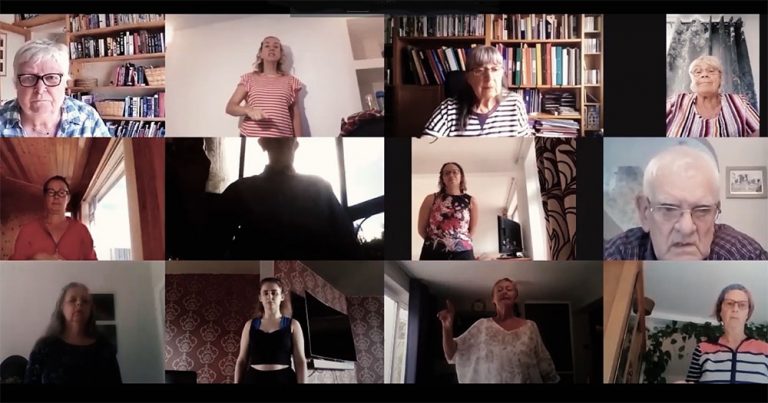Can choir leaders use Singing for Lung Health strategies to help people with long Covid? Musical director Juliet Russell explored this question in a singing project with Covid ‘long haulers’.
Long Covid is an unpredictable and debilitating phenomenon that affects one in 20 people who contract Covid-19.
Sufferers experience shortness of breath, fatigue, muscle pain and brain fog long after falling ill with Coronavirus and often struggle to return to work or normal activities. The condition is so new that medical authorities are still drawing up guidelines on how to manage it.
Treatment will most likely require a multi-pronged approach, and the interesting question for choir leaders is: can singing play a part?
Can Singing for Lung Health help?
Singing is already used to help people with long-term breathing problems, such as Chronic Obstructive Pulmonary Disease (COPD) and asthma, to better manage their symptoms.
The British Lung Foundation runs Singing for Lung Health Choirs that help COPD patients learn techniques to improve their breath management, posture, respiratory strength and muscle condition. The social aspect of coming together and the neurochemical and physical benefits of singing play a crucial part too.
So could the principles behind the programme also help Covid long haulers? It’s a question that musical director and vocal coach Juliet Russell probed in a project called My Voice Lifts My Soul.
The project
The online choir project for people with poor lung health took place over 12 weeks. It aimed to help participants improve their resilience during the pandemic and give them tools to better manage their breathing.
Warwickshire County Council commissioned the project, in conjunction with George Eliot Hospital NHS Trust, Warwick Hospital, and Coventry and Warwickshire Wellbeing for Life.
The leader
Juliet Russell is a composer, singer, choir director and vocal coach on ITV’s The Voice. Her interest in lung health started in 2013 when she led a Singing for Breathing group at Harefield Hospital for the Royal Brompton and Harefield Hospital Trust. Later she became a British Lung Foundation Singing for Lung Health workforce trainer.
The participants
Of the 14 people who took part in My Voice Lifts My Soul, 12 had long-standing lung health issues such as COPD or asthma.
Four had either been diagnosed with or had tested positive for Covid-19. One was asymptomatic, but three were still experiencing the effects three months after first contracting the disease, some experiencing the significant effects of ‘long Covid’.
The sessions
Each weekly session started and finished with 15 minutes of social interaction. The other 90 minutes consisted of physical and vocal warm ups, a range of breathing and respiratory muscle exercises to promote breath management, onset and semi-occluded vocal tract exercises and – of course – singing and learning songs together.
Issues that came to the fore during the project
Reduction in exercise
The pandemic has significantly impacted the exercise levels of people with underlying health conditions (who understandably are often reluctant to go outside for fear of contracting Covid-19).
This is significant because exercise is a crucial part of managing lung health (it’s also useful in managing depression and anxiety, co-morbidities of COPD).
Participant Tracy says: “During Covid, I’ve got really unfit, my lungs especially have got really unfit. I’ve sort of forgotten how to use them properly.”
Jackie, another project participant, says: “I’m scared that my lung health will deteriorate as I’ve not been walking as I should.”
Social isolation
Due to the health crisis, some of the group had lived on their own for months and a number had experienced bereavement during this time. All were more cut off from their family, friends and social support networks.
Grappling with long Covid
The project brought the effects of long Covid into focus. Take, for example, Holly, a mum-of-three and keen runner, who had enjoyed an active lifestyle.
Covid-19 changed all that and months after falling ill with the virus she was still struggling to breathe. “Breathing became something I had to think about; it almost became a conscious process,” she says.
Physiotherapist Lucy says the virus had impacted on her ability to walk, talk (particularly during online work meetings) and breathe.
Results
All 14 participants said the project had helped them manage their breathing. Some had used the techniques they learned in the choir in daily life – for example when struggling to climb stairs.
Lucy says: “It’s given me much better breath control and in online work meetings, I’m sometimes able to make my voice heard.”
The choir also had an impact on psychological well-being. Nikky, an asthmatic who has been shielding since March, says the choir gave her a “sense of freedom for which I’m very grateful”. Keith says it gave him a reason to get up in the morning.
Teaching perspective
Juliet says: “While the project found that it is certainly possible to integrate people recovering from Covid-19 in Singing for Lung Health sessions, it is extremely important to understand the different presentations across diseases and to work in an adaptive and responsive way.
“There is no ‘one size fits all’ approach. For example, in singers with obstructive lung diseases, the focus is on extending the exhalation and minimising short ‘top up’ breaths that can be a feature of the disease. In Covid-19 recovery, the goal is to relearn the recruitment of the primary muscles of respiration and to ‘normalise’ breathing, not to over-extend it.”
Juliet’s tips and takeaways
- Don’t make assumptions about what people with lung health issues can and can’t do. “They’re often more active and able that you might expect.”
- Adapt exercises and repertoire to suit the different needs of people in your group.
- The advantage of working online is that people are more likely to do solos than if they had to get up in front of a group of people.
- Ask for feedback from the singers at each stage. This will help you to tailor sessions to avoid any over-extending or fatigue while also ensuring singers feel challenged and motivated.
Watch this to learn more about the project.
Website: julietrussell.com




